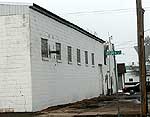The sex industry grows
By Dan Gunderson
Minnesota Public Radio
March 4, 2002
|
| RealAudio |
The sex industry grows | Small towns react | The legal battle continues | Nicollet - the moral battleground | Exotic dance - is it art?
The sex industry is making waves in small town Minnesota. Strip clubs are moving out of the shadows and onto Main Street. More than a dozen rural Minnesota cities and counties wrestled with adult business regulation in the past year. Some sociologists say sex is everywhere in American culture. But most people are still afraid to talk about it. As a result, the sex industry is cashing in. Adult-oriented businesses and strip clubs are making profits in new locations, from new customers.
| |
|
|
|
||
Small town Minnesota may seem a world away from the bright lights of Las Vegas. But the sex industry is expanding beyond the bright lights, to quiet small towns.
Sex sells. The idea is certainly not new. But does using sex to sell products make it easier to sell sex? Sociologist Kate Hausbeck says yes.
"When you watch Britney Spears in some of her videos for example, and you just step back from watching the video, it's not terribly different than some of the performances you'd see in strip clubs," Hausbeck says. "The kind of sexuality that's just so blatantly open."
Kate Hausbeck teaches at the University of Nevada-Las Vegas. For the past seven years she's examined trends in the sex industry. The legal sex industry is secretive. It's hard to document the explosive growth.
Hausbeck says it's clear business is booming, driven by big profits and seemingly insatiable consumer demand.
"The contradiction between sexual images and messages everywhere, and yet not arming ourselves and our populace with good information, really leaves the door wide open for the sex industry to step in and promote their wares, so to speak," she says.
Hausbeck says it appears only one thing checks the growth of sex-related businesses - tough zoning regulations, which can make it difficult or expensive to start a business.
Hausbeck says dark, sleazy clubs with a bad reputation are no longer the public face of the sex industry. Businesses now range from franchised upscale gentlemen's clubs catering to white collar businessmen, to the locally-owned nudie bar with its regular clientele.
The clubs are marketed as entertainment, but most owners are shy about publicity.
| |
|
|
|
||
One who agreed to talk is the owner of the Mirage Gentlemen's Club in the small southern Minnesota town of Nicollet. Matt Halley, 20, says he's in the business because the money is good.
"These clubs are easy to start up, they don't cost much money...and once they're open they make a very large amount of money," says Halley.
People who oppose strip clubs often argue they spawn illegal activity, such as drugs and prostitution. Dan Ridenberg, director of a Minneapolis organization that helps women get out of prostitution, makes that argument as well. Ridenberg can't offer statistics, just a hunch that legal strip clubs lead to illegal prostitution.
"I don't know that I can give you an exact percentage, but I would guess it would be 90 percent or greater," says Ridenberg. "Most of the time in these strip clubs, the massage parlors, the escort services, the women are engaging in illegal activities."
Ridenberg says he's concerned small town strip clubs will get away with breaking the law.
"It is a problem in outstate Minnesota in that we don't have enough policing, we don't have enough enforcement. We don't have enough of the criminal prosecution, like we do for example, here in Hennepin County," says Ridenberg.
But industry insiders say as strip clubs move from the back alley to Main Street, they're becoming good citizens. Club owner Matt Halley says the legal money is simply too good to risk.
|
"When you watch Britney Spears in some of her videos...it's not terribly different than some of the performances you'd see in strip clubs...the kind of sexuality that's just so blatantly open."
- Sociologist Kate Hausbeck |
"If you start breaking laws, you start selling drugs, you start pimping your girls out, you're going to be shut down. End of story. You're out," says Halley. "And to me, the extra few thousand dollars a month I'd make doing something illegal isn't worth losing my whole company over.
Some police agree strip clubs cause few problems. Owners want to avoid law enforcement attention and negative publicity.
Matt Halley expects to finance his own commercial real estate development company with strip club profits.
Those profits are possible only because there are women who are willing to take off their clothes on stage for money.
"The short amount of time I have to work for the amount of money I make, allows me more time to spend with my children, and go to school, and still pay my bills," says Stacey Zent, who's been a strip club dancer for the past 10 years.
Zent fits a common stripper profile. She's a single mom with young children, trying to earn her college degree. Zent says on a good night, she can make $300 to $400 in tips. She likes working clubs in small towns. The patrons are friendly, the tips are good.
Sociologist Kate Hausbeck says she's interviewed dozens of strippers. All say they do it for the money. But she says most would choose another profession if they could. Given the choice between stripping and taking a minimum wage job, they opt for the higher pay.
| |
|
|
|
||
Hausbeck says the stereotype that all strippers are prostitutes is wrong. She says many women use stripping to pay for college, and find a new career after a few years. Hausbeck says there are those who end up in prostitution or pornography. But she says, more importantly, all the women are exploited by the sex industry, and often villified by the public.
"If we start to think about women who work in the sex industry as being degenerate or promiscuous or sluts, or somehow lesser than the rest of us, we're perpetuating the problem," she says.
Hausbeck says women are the easy target when people choose not to have an honest debate about why the sex industry is so successful. Its success is built on consumers - people willing to pay for sexual entertainment. Hausbeck says the typical consumer is an upper middle class man, but that's changing, too.
Hausbeck says as the sex industry becomes more mainstream, the clientele more than ever represents a cross section of society. Attempts to interview sex industry customers were unsuccessful. Most, it seems, don't want to discuss their activities.
Sociologist Kate Hausbeck says the sex industry contributes to social problems - ranging from violent crime to unhealthy male attitudes toward women and sex.
"If we're willing to accept nudity and sexualization in our culture everywhere else - to sell products and services at grocery stores, in magazines, on billboards - then I think that means we should be willing to have intelligent, informed discussions on the topic," says Hausbeck. "If we do, I think the odds are good we can start to grapple with some of these problems in a meaningful way. If we don't, then I think we're doomed."
Doomed, says Hausbeck, to a world where for better or worse, strip clubs are as common as fast food joints on Main Streets everywhere.
More Information


